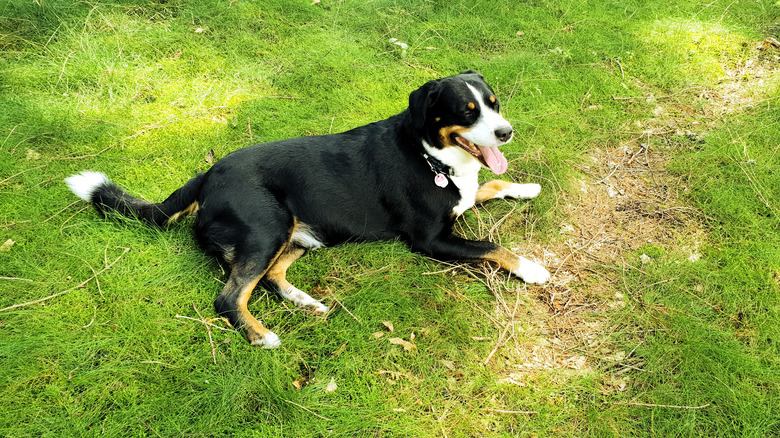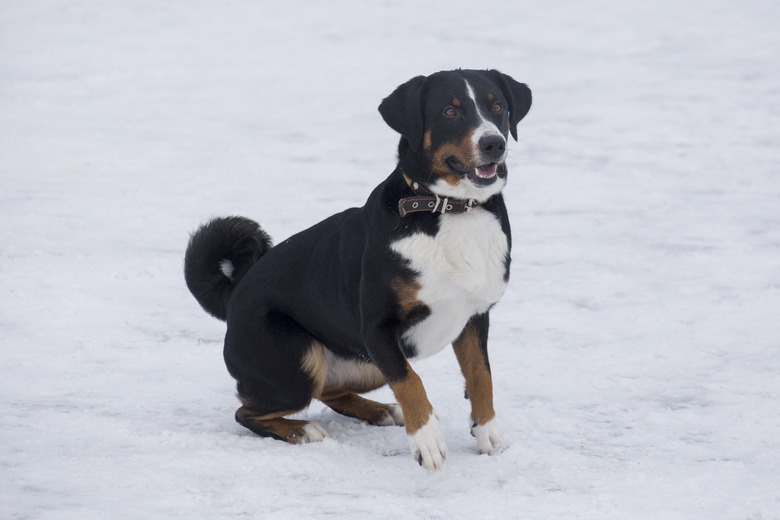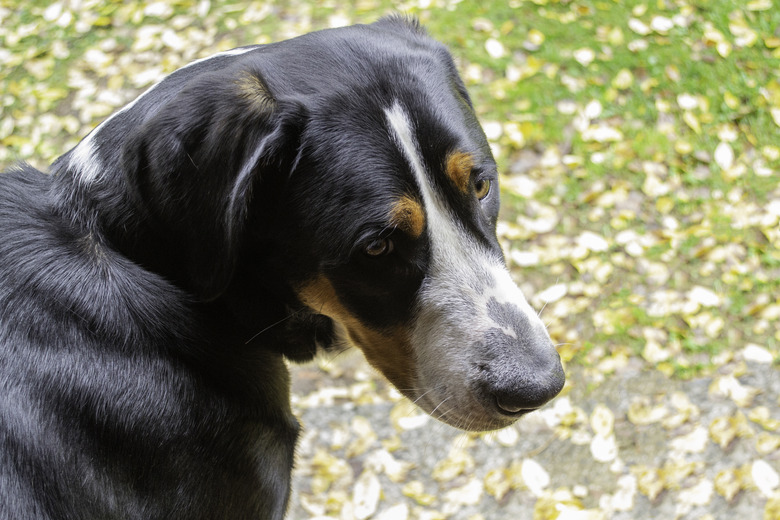Appenzeller Sennenhund Dog Breed Facts & Information
The medium-size Appenzeller sennenhund has an appealing, happy dog face. This rare, loyal, and high-energy working dog is a unique combination of small dog features with a big dog build. Their ears are triangular and usually floppy, and they hang down to the dog's cheeks. This dog breed is always tricolored — black or brown with symmetrical markings similar to a Bernese mountain dog but with short fur. They have a double coat with the top coat being tight, thick, and shiny. Their undercoat is also thick and can be black, brown, or gray.
Considering the Appenzeller sennenhund is also called the Appenzeller mountain dog or Appenzeller cattle dog, learning that this breed has a history of herding and guarding livestock, including cattle, is no surprise. This unique dog of different names is considered a rare breed because the breed stock is limited. This dog breed is recommended by breeders for active, experienced dog people who, like the Appenzeller sennenhund, do not tire easily.
Appenzeller sennenhund history
Appenzeller sennenhund history
The origin of the original sennenhund is subject to debate. Some believe that the sennenhund descended from a mix of Roman and Germanic breeds, while others believe the Appenzeller sennenhund is just as old or older than the greater Swiss mountain dog. Today, however, the Appenzeller sennenhund is considered a type of Swiss mountain dog.
Apparently, this dog breed was often seen on dairy farms helping farmers drive cattle to village markets in the Appenzell regions of Switzerland. In fact, "sennenhund" means "dairy farmer's dog." What we do know is that the Appenzeller sennenhund was used to pull carts and protect the farm from thieves and predatory wild animals, including wolves. By 2007, the Appenzeller sennenhund had been entered into the American Kennel Club's Foundation Stock Service Program.
Appenzeller sennenhund characteristics
Appenzeller sennenhund characteristics
The Appenzeller sennenhund is a medium- to large-size dog weighing between 48 and 70 pounds. An adult Appenzeller sennenhund can be up to 28 inches tall. The height, measured from the shoulder, usually ranges from 19 to 22 inches.
A mid-size dog, the male and female Appenzeller sennenhunds are close in size. The life span of this dog breed averages 12 to 15 years. Additionally, high-pitch barking is a breed characteristic, as are folded ears and a coat of symmetrical tricolors, including a white neck and chest.
Appenzeller sennenhund temperament & training
Appenzeller sennenhund temperament & training
The Appenzeller sennenhund can be a good family dog and companion when the dog's activity and socialization needs are met, according to breeders and experts. While moderately loving, these dogs are also extremely intelligent and can be good with children, though that's not one of their defining character traits.
Breed is not a reliable indicator of personality; however, Appenzellers are more suspicious of strangers than the usual herding dog and will not warm up to visitors right away, making them good watchdogs. This former herding and guard dog will likely be more protective of your family than other dog breeds. Interestingly, they are known to be very sensitive to human emotions.
Lively, agile, and versatile are adjectives used to describe the Appenzeller sennenhund. Like any dog, especially a working dog breed, the Appenzeller sennenhund requires training, and starting as a puppy after 8 weeks old is a good idea. Look for trainers who utilize positive, reward-based training techniques. The Appenzeller sennenhund can sometimes become dominant, pushy, and willful when not provided with strong and consistent leadership. It is important to set rules, boundaries, and limitations early in the dog's life.
Appenzeller sennenhund grooming
Appenzeller sennenhund grooming
The smooth-coated Appenzeller sennenhund is reasonably low maintenance in the grooming department, requiring weekly brushing to remove dead and loose hair. Like any double-coated dog, the Appenzeller sennenhund will shed, most noticeably in the spring and fall. The thick, shiny coat will benefit from light grooming.
Because the Appenzeller sennenhund's ears fold down, they are prone to dirt accumulation, so regular ear cleaning is required for this dog breed. These types of ears are particularly prone to ticks, so check for ticks after each outdoor walk.
Appenzeller sennenhund exercise & health
Appenzeller sennenhund exercise & health
The Appenzeller sennenhund is an energetic dog breed requiring an active lifestyle filled with romping, roughhousing, and many outlets for boundless energy, such as agility, herding, and fetching. Because of this dog breed's sturdy build, they are stronger than they look and excel at cart and sled pulling and even weight-pulling competitions. Strength has other advantages; the Appenzeller sennenhund is considered a healthy breed with few health issues and a longer than average life span.
Appenzeller sennenhund puppies
Appenzeller sennenhund puppies
Finding an Appenzeller sennenhund isn't easy because this is considered a rare dog breed, and there are not many breeders in North America. Also, the average size of an Appenzeller sennenhund litter is six, which is smaller than other dog breeds. This means Appenzeller sennenhund puppies are rare and likely expensive. Some are even imported from other countries, adding to the cost of Appenzeller sennenhund puppies. Like most mid-size dogs, the Appenzeller sennenhund reaches sexual maturity at 1 year old.
Though Appenzeller sennenhund breeders are hard to find, the American Kennel Club is a good place to start to find reputable breeders for any breed, including the Appenzeller sennenhund. The United Kennel Club is another organization that can source reputable breeders, and the UKC recognizes the Appenzeller sennenhund as a purebred in its guardian dog group.
Read more about how to teach your dog to sit. Read more about different husky dogs.


